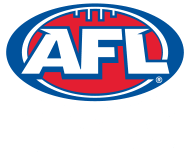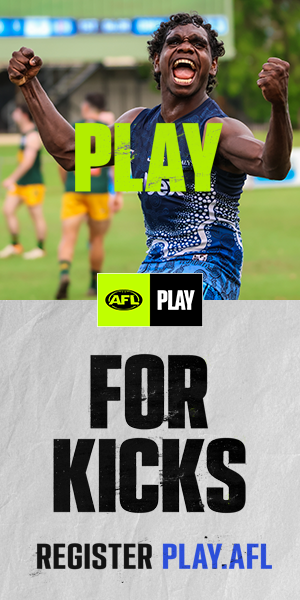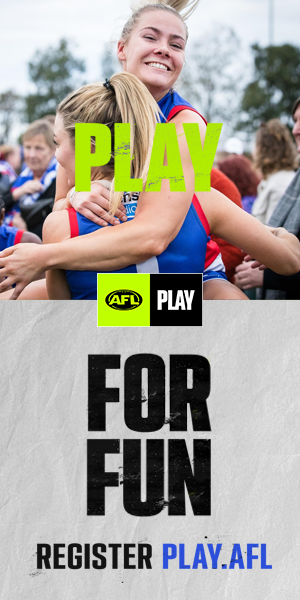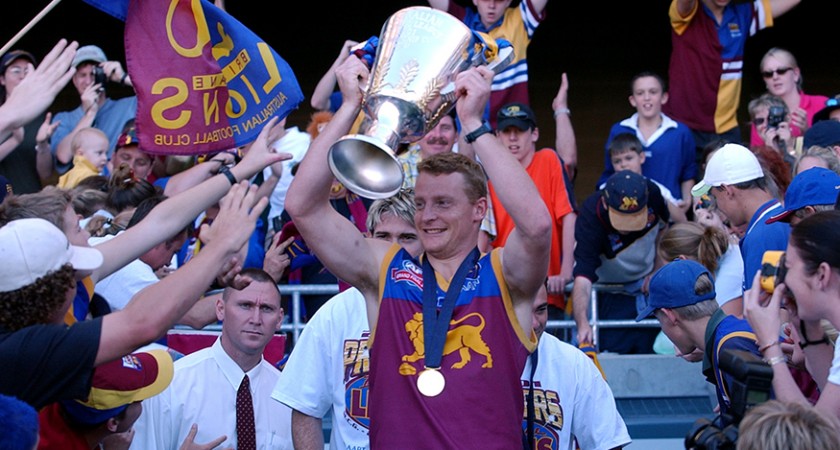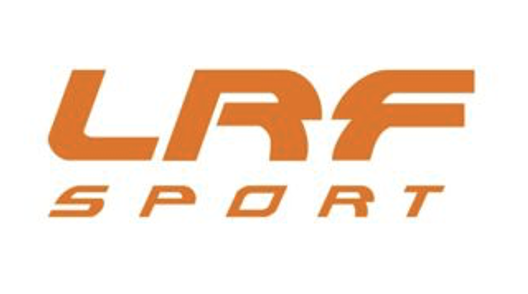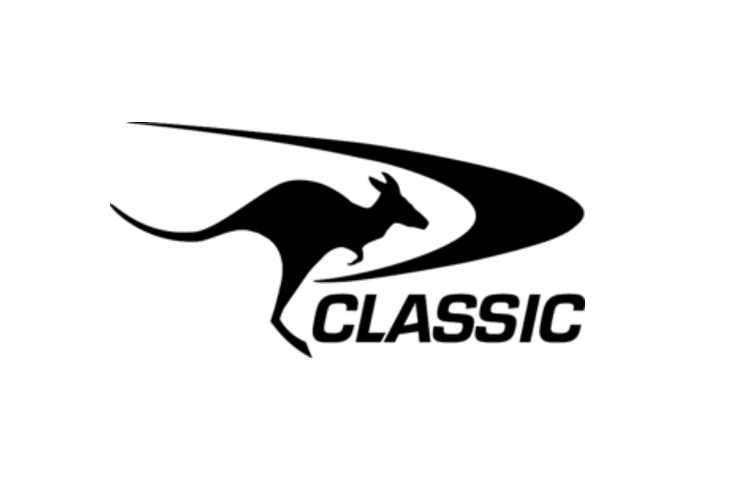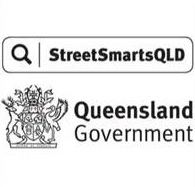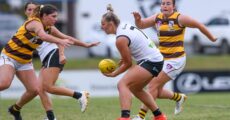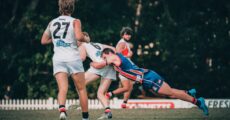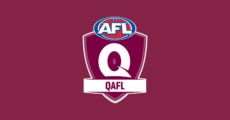If you are a fair-dinkum Queensland football fan there can be only choice to sit at the top of the all-time top 10 favorite moments in the AFL … the Brisbane Lions’ 2001 premiership.
The picture of Michael Voss, favourite son of Queensland football, holding aloft the premiership cup at the MCG on Saturday 27 September 2001 is simply unchallenged.
It is the moment that warmed the hearts of Queenslanders who for so long had endured the code’s battle for recognition and success in a State that was for so long dominated by the rugby codes.
Asked to nominate a top 10 Queensland AFL finals moments as the 2016 Toyota AFL Premiership kicks into finals mode this week it was a no-brainer. An automatic choice regardless of any club loyalties prior to the establishment of the Brisbane Bears turned Lions.
Simply, it doesn’t get any better. Not for the true Queenslanders. And certainly not for this old-timer, who lived through the code’s fight just to get a VFL licence in 1987 and thereafter the struggles of the ‘Bad News Bears’.
Voss, the Morningside junior named captain of the Queensland Team of the Century who so appropriately was the man to headline Queensland’s greatest football moment, was joined on the AFL’s biggest stage 15 years ago by five fellow Queenslanders – Jason Akermanis, Marcus Ashcroft, Robert Copeland, Clark Keating and Mal Michael.
It could easily have been seven Queenslanders. Matthew Kennedy, a 188-game Gold Coaster who had done the hard yards in the early days of the Bears, had played in the preliminary final as a replacement for the suspended Alastair Lynch. But Kennedy was the unfortunate victim of a selection squeeze when Lynch returned for the grand final and never played at AFL level again.
The Queensland group of Voss, Akermanis, Ashcroft, Michael, Keating and Copeland had played a pivotal role in the Lions’ glorious run of 16 consecutive victories under coach Leigh Matthews that culminated in a 26-point win over Essendon and put the code front and centre in Queensland folklore.
Five days before the grand final Akermanis, a Mayne product, had made football history of his own when he’d become the first Queenslander to win the coveted Brownlow Medal.
Ashcroft, from Surfers Paradise via Southport, was another history-making pioneer. He’d waited until his 268th AFL game to taste the ultimate success. At the time it was the longest such wait in the game’s history.
Indeed, each of the Queenslanders had their own fairytale.
Keating, born and bred on the Gold Coast, was a basketballer and First XI rugby player at The Southport School who had joined the Bears as a 15-year-old in 1991 and waited five years to debut.
Copeland, born in Redcliffe, raised in Kilcoy and a product of Strathpine juniors, had started the 2001 season on the Lions rookie list, made his senior debut as a replacement for Voss in the Ansett Cup grand final, and finished the year with 17 games, 16 wins and a flag.
And Michael, a Kenmore junior born in Papua New Guinea, who had gone via Morningside to Collingwood to get his break at the top level in 1997. He was the first rookie in AFL history to play senior football, and was lured ‘home’ in a recruiting masterstroke in 2001 to play a crucial role in the Lions’ success.
After the simple choice of No.1 on the all-time Queensland finals hit parade it’s more challenging to select moments two to 10. And to appropriately recognise people and events deserving of recognition.
I couldn’t find room for the 1991 AFL Grand Final in which Mt.Gravatt junior Stephen Lawrence, son of a former South African Test cricketer, was as huge contributor to Hawthorn’s 53-point win over West Coast.
Likewise, no room for the 2008 Grand Final when Michael Osborne, a two-time rookie in his 99th game, and fellow Gold Coaster Brett Renouf, playing just his eighth AFL game, helped Hawthorn beat Geelong by 26 points.
Or the 2010 premiership decider when yet another Gold Coaster, Dayne Beams, was a member of the Collingwood side that beat St.Kilda by 56 points in the grand final replay after the two sides had played a draw a week earlier. It was the ultimate vindication for the Gold Coaster who had passed up a guaranteed contract with the Gold Coast expansion to take his chances in the draft because he wanted to play in the football heartland of Melbourne.
Similarly, there was no room for one of the great Grand Final trivia moments in which Aaron Keating, brother of Clark, enjoyed the ultimate success in just his third AFL game when the Adelaide Crows beat St.Kilda by 31 points in 1997. Keating played only six AFL games in total but remains one of Queensland’s 17 AFL premiership players.
There will be much debate, but with an unashamed parochialism and a slant towards history here goes.
#2 – Brisbane Lions – 2002 Grand Final
With moments to go in a cold and wet 2002 grand final Jason Akermanis snapped truly over his shoulder to give the Lions a nine-point win over Collingwood and their second flag.
The Lions had smashed Adelaide by 71 points in the qualifying final and Port Adelaide by 56 points in the preliminary final, both at the Gabba, and went into the grand final overwhelming favorites
So, it was an altogether different emotion to that of the first flag. Given the extraordinary public pressure and expectations within the emerging superpower it was more a relief in 2002 after the sheer joy of 2001. But unforgettable nevertheless.
The Fab Five of Voss, Akermanis, Ashcroft, Keating and Michael were back for their second flag, and had judging not been done prematurely Voss would and should have won the Norm Smith Medal as best afield.
#3 – Brisbane Lions – 2003 Grand Final
The joy of 2001 and the relief of 2002 turned to disbelief when the Lions obliterated Collingwood by 50 points in the 2003 grand final to make it three flags on the trot.
It seemed like mission impossible when they lost the qualifying final that year to Collingwood, forcing them into a Gabba semi-final against Adelaide, which they won by 42 points, and a preliminary final against Sydney at the Olympic Stadium, which they won by 44 points after a massive final quarter against the odds.
The question was ‘had they spent all their petrol tickets?’ And the answer was an overwhelming ‘no’ as the Lions were so dominant on grand final day that in the final quarter, with the margin blowing out to 11+ goals, the players allowed themselves a few early celebrations.
There were seven Queenslanders in the all-conquering three-peat Lions side. Copeland was back to join Voss, Akermanis, Ashcroft, Keating and Michael, and Jamie Charman joined the group.
This was another football fairytale. Born in Maryborough and a product of the Sandgate juniors via Nudgee College and the Northern Eagles, Charman, squeezed out of the 2002 finals side by Keating’s late return from injury, had been playing in Cairns while studying to be a primary school teacher three years earlier.
#4 – Brisbane Bears – 1995 Elimination Final
It had been a tough gig covering the ‘Bad News Bears’ in the local paper, arguing for column centimetres to write about a side that struggled more often than not while the Brisbane Broncos took all before them in the rugby league.
After a comparatively encouraging six, seven and eight wins in the first three years of the Bears in 1987-88-89 there were back-to-back wooden spoons in 1990-91. And just seven wins in total, followed by four wins in 1992 and 1993.
So, when the Bears turned the football world upside down to qualify for the finals for the first time in 1995 under coach Robert Walls it was a moment to behold.
Sitting 14th on the 16-team ladder at Round 15 with a 4-11 win/loss record, they won six of their last seven games to sneak into eighth spot. Their only blemish in the charge to September was a 14-point Round 19 loss to eventual premiers Carlton, who later beat North Melbourne by 62 points in the preliminary final and Geelong by 61 points in the grand final.
It was Carlton who ultimately put an end to the Brisbane dream, taking the qualifying final by 13 points. But after the Blues had led by 22 points at quarter time the finals new boys more than held their own, and after the one-sided finals that followed they were rightfully acclaimed as the second best team of September.
Four Queenslanders were part of that historic first Bears finals side – Voss, Akemanis, Ashcoft, and 29-year-old Wilston-Grange junior Scott McIvor, who had played three finals with Fitzroy in 1986 during a 55-game stint with the club from 1985-87 before being lured home.
#5- Brisbane Bears – 1996 Elimination Final
Brisbane football fans feasted on their first home final in week one of the 1996 finals.
Having finished third on the home-and-away ladder with a 15-1-6 record, the Bears hosted sixth-placed Essendon in front of a sell-out and then-record Gabba crowd of 21,964.
It was one of the great finals contests as the Bears hung on to beat the Bombers by a point in a cliffhanger finish in which the visitors’ Brownlow Medallist Gavin Wanganeen hit the post with a heavily pressured late snap at goal.
There were five Queenslanders in action in the first Gabba final – Voss, Akermanis, Ashcroft, Kennedy and Danny Dickfos, the Windsor-Zillmere stalwart and Grogan Medallist who, after ignoring AFL approaches for several years to play with his mates at O’Callaghan Park, finally relented at age 25 and played the first of four years and 65 AFL games in 1996.
The following week, to complete a monstrous Gabba double-header, the Bears obliterated Carlton in the semi-finals by 97 points in front of another sell-out amid a frenzy of media attention and public excitement. Ashcroft had 34 possessions – most by a Queenslander in a final.
There wasn’t quite the fairytale finish after the brave Bears, hit hard by injury and without Voss and Akermanis, were beaten by eventual premiers North Melbourne in the preliminary final at the MCG the following week, but the boost for the code across the board was massive nevertheless.
#6 – Jason Dunstall – 1986 Grand Final
In his early teenage years Jason Dunstall had been a handy schoolboy soccer player and cricketer at Churchie, had but curiously slid under the football radar.
In 1984 he exploded onto the football scene as a spring-heeled 18-year-old who starred for Coorparoo in the QAFL premiership win over after a standout debut for Queensland in a win over Tasmania that would be part of the launching pad for the eventual birth of the Bears.
In 1985, in just his 16th AFL game, he played in a grand final for Hawthorn against Essendon that marked the end of the phenomenal career of Leigh Matthews.
But, as hard as it might be to top the ’85 GF as my favourite finals moment for the man they now call ‘Chief’ there is one better. Just.
Twelve months later, still only 22 and still playing only his 38th AFL game, Dunstall kicked six goals in the Hawks’ 42-point win over Carlton in the 1986 grand final. Six straight.
It would be the first of four flags for the game’s No.2 goal-kicker all-time, and for all the September success and accolades that would follow, including seven goals in the 96-point grand final slaughter of Melbourne in 1988 and another six in the 1991 grand final win over West Coast, this to me was the most memorable.
#7 – Gavin Crosisca – 1990 Grand Final
There have been few more famous AFL grand final wins than the Collingwood triumph over Essendon in 1990, which killed off the dreaded ‘Colliewobbles’.
Front and centre in a match which feature a shocking quarter-time brawl was 22-year-old Queenslander Gavin Crosisca, playing his 72nd game.
A Moorooka junior recruited by Collingwood from Western Districts after he represented Queensland as a 16-year-old, Crosisca was renowned as a hard and close-checking utility defender.
But during the 1990 finals series he found himself playing as a makeshift centre half forward as a similarly undersized Gavin Brown played as a leading full forward. And although the Queenslander’s statistics weren’t overwhelming the role he played for coach Leigh Matthews and his side was huge.
Crosisca would go on to become the first Queenslander to play 100 AFL games and the third Queenslander to 200 games behind Jason Dunstall and Scott McIvor.
#8 – David Hale – 2015 Grand Final
David Hale, son of an Olympic oarsman and picked #7 in the 2001 AFL National Draft from Coolangatta via Broadbeach, played his 237th and last AFL game in the 2015 grand final. And he went out in style.
Hale retired as a triple premiership player, having played as a key forward/ruckman in the almighty Hawthorn side of 2013-14-15 after they’d lost the 2012 grand final to Sydney.
It was the second phase of a wonderful AFL career, and confirmation of the old ‘right place, right time’ philosophy that so often differentiates great from good.
It wasn’t that Hale did anything spectacular on grand final day. He didn’t. The statistics sheet said he had six possessions and nine hit-outs. And, for the trivia addicts, he was the last player ever to be substituted out of an AFL game before the abandonment of the dreaded “red vest”.
But he did his job. As he’d done through 128 games in eight years at North Melbourne from 2003-10 before switching to Hawthorn in 2011 to play a further 108 games.
This was the end of a long, hard road and a moment in Queensland football history as Hale, the only Queenslander to play 100 games for two clubs, joined four-time premiership winner Dunstall and three-time premiership winners Voss, Akermanis, Ashcroft, Keating and Michael at the top of the Queensland AFL Honour Roll.
#9 – Nick Riewoldt – 2010 Grand Final
It’s impossible and entirely inappropriate to compile a list of 10 AFL finals moments without finding a spot somewhere for Nick Riewoldt. Simply, it wouldn’t be right. The boy from Broadbeach via Southport is a St.Kilda megachampion. But which one?
Given that Riewoldt has always been driven by the lure of a flag I settled on the 2010 grand final draw because it was as close as he has come.
It wasn’t a joyous Riewoldt moment but for high drama and emotion it doesn’t get much better.
The Saints had led by a goal at the 22-minute mark of a short final quarter before the Pies scored a rushed behind and then hit the front at 26 minutes via a close-range Travis Cloke goal.
In an epic finish St.Kilda had one last chance when Lenny Hayes bombed the ball long towards to Stephen Milne in the pocket. A favourable bounce and he would have gathered and run into an open goal, but the ball bounced sideways and went through for a behind. Scores level.
For 15 seconds the game was camped in the St.Kilda forward line but Colingwood hung on and time ran out. Collingwood won the replay by 56 points.
Riewoldt, like fellow Queenslander Sam Gilbert was devastated. He has played only one final since – a loss in the 2011 elimination final.
#10 – Frank Dunell – 1984 Grand Final
Frank Dunell had played at Windsor-Zillmere in the QAFL in 1978, the season before I started writing football for The Courier-Mail.
A match-winning utility forward at the time, he was recruited by Essendon on an old ‘Form Four’ that was used by the then VFL clubs to secure players from interstate.
A Queenslander playing at the highest level was something of a novelty at the time but Dunell never lost touch with his roots, and when inducted as an inaugural member of the Queensland Hall of Fame in 1998 he was as excited as anyone in the room.
So, it was something very special in 1984 to see him collect a then VFL premiership medallion after Essendon beat Hawthorn by 24 points in the grand final.
Dunell, who went on to play 100 games for Essendon and 15 games for the Brisbane Bears, was the second player acclaimed as a Queenslander to win a flag. He followed Carlton’s 1982 premiership ruckman Warren Jones, who was born in New Zealand but grew up in Brisbane and learned the game at Morningside before being snapped up by the Blues.
